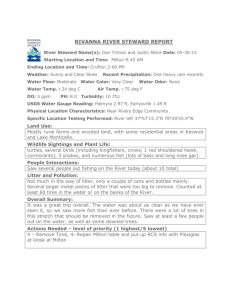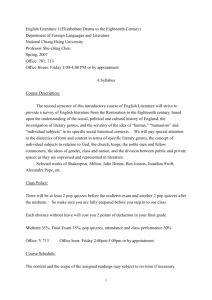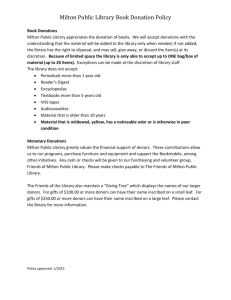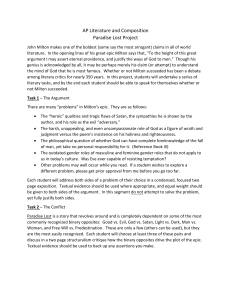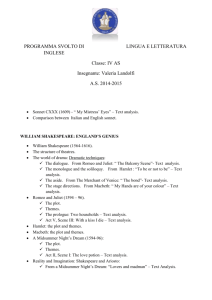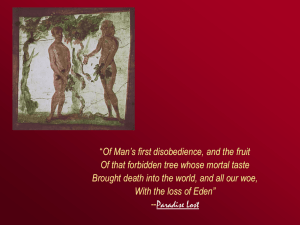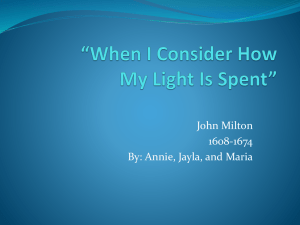FORBIDDEN KNOWLEDGE Verse ANALYSIS: FROM Shakespeare
advertisement
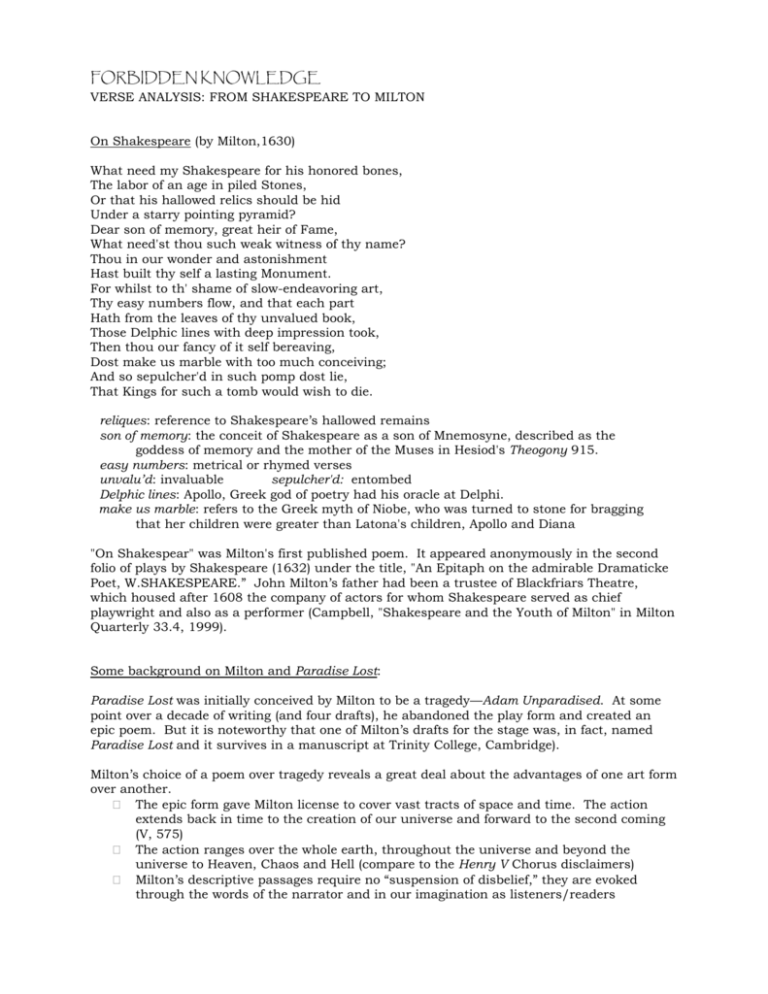
FORBIDDEN KNOWLEDGE VERSE ANALYSIS: FROM SHAKESPEARE TO MILTON On Shakespeare (by Milton,1630) What need my Shakespeare for his honored bones, The labor of an age in piled Stones, Or that his hallowed relics should be hid Under a starry pointing pyramid? Dear son of memory, great heir of Fame, What need'st thou such weak witness of thy name? Thou in our wonder and astonishment Hast built thy self a lasting Monument. For whilst to th' shame of slow-endeavoring art, Thy easy numbers flow, and that each part Hath from the leaves of thy unvalued book, Those Delphic lines with deep impression took, Then thou our fancy of it self bereaving, Dost make us marble with too much conceiving; And so sepulcher'd in such pomp dost lie, That Kings for such a tomb would wish to die. reliques: reference to Shakespeare’s hallowed remains son of memory: the conceit of Shakespeare as a son of Mnemosyne, described as the goddess of memory and the mother of the Muses in Hesiod's Theogony 915. easy numbers: metrical or rhymed verses unvalu’d: invaluable sepulcher'd: entombed Delphic lines: Apollo, Greek god of poetry had his oracle at Delphi. make us marble: refers to the Greek myth of Niobe, who was turned to stone for bragging that her children were greater than Latona's children, Apollo and Diana "On Shakespear" was Milton's first published poem. It appeared anonymously in the second folio of plays by Shakespeare (1632) under the title, "An Epitaph on the admirable Dramaticke Poet, W.SHAKESPEARE.” John Milton’s father had been a trustee of Blackfriars Theatre, which housed after 1608 the company of actors for whom Shakespeare served as chief playwright and also as a performer (Campbell, "Shakespeare and the Youth of Milton" in Milton Quarterly 33.4, 1999). Some background on Milton and Paradise Lost: Paradise Lost was initially conceived by Milton to be a tragedy—Adam Unparadised. At some point over a decade of writing (and four drafts), he abandoned the play form and created an epic poem. But it is noteworthy that one of Milton’s drafts for the stage was, in fact, named Paradise Lost and it survives in a manuscript at Trinity College, Cambridge). Milton’s choice of a poem over tragedy reveals a great deal about the advantages of one art form over another. The epic form gave Milton license to cover vast tracts of space and time. The action extends back in time to the creation of our universe and forward to the second coming (V, 575) The action ranges over the whole earth, throughout the universe and beyond the universe to Heaven, Chaos and Hell (compare to the Henry V Chorus disclaimers) Milton’s descriptive passages require no “suspension of disbelief,” they are evoked through the words of the narrator and in our imagination as listeners/readers The original drafts of Paradise Lost as a tragedy included the following: The war in heaven is related by a chorus Temptation takes place off-stage (how would one perform a serpent?) God and Son never appear or speak. God does not appear. Adam and Eve could not be naked on stage. In one version they enter after temptation, clothed. How might Milton stage the following passage? (V, 379-85): …But Eve (Undecked save with herself, more lovely fair Then wood-nymph, or the fairest Goddess feigned Of three that in Mount Ida naked strove), Stood to entertain her guest from Heav'n. No veil She needed, virtue-proof, no thought infirm Altered her cheek. Scansion: reading/speaking Shakespeare and Milton Milton wrote Paradise Lost in a strict blank verse style of iambic pentameter. There are few rhyming lines, no broken or altered lines, dialogue consists of monologues or speeches. Of man’s first disobedience, and the fruit (I, 1) Of that forbidden tree, whose mortal taste Brought death into the world, and all our woe, With loss of Eden, till one greater man Restore us, and regain the blissful seat, Sing Heav'nly Muse… …I thence (I, 12) Invoke thy aid to my advent’rous song And chiefly thou, O Spirit, that dost prefer (I, 17) Before all temples th’ upright heart and pure Instruct me... Compare Shakespeare’s reference to the theatrical muse in the Prologue to Henry V spoken by the Chorus: O for a Muse of fire, that would ascend The brightest heaven of invention. A kingdom for a stage, princes to act And monarchs to behold the swelling scene! Then should the warlike Harry, like himself, Assume the port of Mars; and at his heels, Leash'd in like hounds, should famine, sword and fire Crouch for employment. But pardon, gentles all, The flat unraised spirits that have dared On this unworthy scaffold to bring forth So great an object: can this cockpit hold The vasty fields of France? or may we cram Within this wooden O the very casques That did affright the air at Agincourt? O, pardon!... And let us, ciphers to this great accompt, On your imaginary forces work.... For 'tis your thoughts that now must deck our kings, Carry them here and there; jumping o'er times, Turning the accomplishment of many years Into an hour-glass: for the which supply, Admit me Chorus to this history; Who prologue-like your humble patience pray, Gently to hear, kindly to judge, our play!
